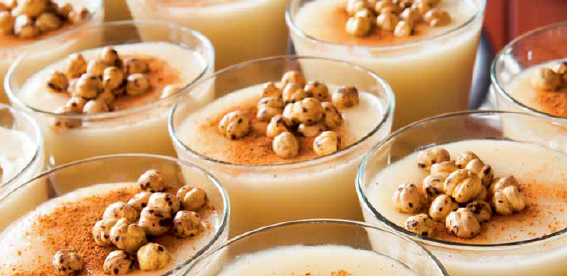Boza is a traditional soft drink that means more to us then just a beverage with a history that goes way back in Turkish cuisine and its sweet-sour taste that lingers on palates, identified with strong voices of boza-sellers echoing in the streets… As the first ice cream in children’s hands is a harbinger of summer, when a boza-seller carrying a jug passes from the street around nightfall shouting “Booozaaa … Come on, booozaaa …” we are reminded that the winter is near.
Although its ingredients, varieties and presentation style has varied in the course of history, boza has an important place among Turkish traditional fermented beverages with its taste and nutritional value. Looking at its historical dimension, boza and boza drinking tradition in Turkish culture is as old as the known Turkish history however we see that there are similar drinks with different names in various regions of the world. The reason is that the agricultural products such as millet, barley, wheat and corn, which are the main ingredients of boza, are grown over a very wide geography.
Similar to many products and establishments in our culture, boza also attained its original form still produced today in the Ottoman period and has a permanent place. The expressions such as bozahane (boza shop), boza-seller used in the Ottoman period, are proofs that boza was not only a beverage but also a commercial product.
In Turkish culture boza is a sweet-sour, non-alcoholic fermented winter drink which can be enjoyed from cold autumn days to cool spring days although it is consumed in different parts of the world (Central Asia, Balkans, Africa, Far East) with different names (bousa, bouza, buha, merissa) and has different functions (alcoholic, fruit flavoured beverage). Although it can be consumed also in summer months for its cooling effect thanks to its lactic acid content, it is not preferred because it is spoiled fast at high temperatures.
Today this ancient drink is produced as follows: according to Turkish standards, boza is defined as a product prepared by adding drinking water to crumbs or flours of one or several cleaned cereals such as millet, rice, wheat, and maize, and by adding sugar to it for lactic acid fermentation, following the technique. Experts state that in Turkey, flour or farina of all grains are used in boza production however the most suitable taste and flavour is obtained from millet. According to sources, boza generally consumed with cinnamon today, was consumed in the Ottoman period with molasses, and was sprinkled with cinnamon, clove, ginger and very finely grated coconut. Eating roasted chickpeas with Boza became widespread more recently.
Today, Boza is identified with some regions of Turkey and has a great brand value for these regions. These places are Vefa Bozacısı in Istanbul, Akman Boza in Ankara, Soydan in Bilecik / Pazaryeri and Karakedi Bozacısı in Eskişehir.
BOZA CULTURE OF EVLİYA ÇELEBİ
There are many anecdotes on boza in Evliya Çelebi’s Seyahatname, which significantly sheds light on Turkish cultural history. Our Evliya widely covers boza tradesmen, bozahanes (boza shops) and boza varieties in his work. According to the information given in “Esnâf-ı Bozacıyan” section, 1500 boza makers and sellers worked in 300 shops in the 17th century Istanbul. Again according to the information provided in Seyahatname, boza makers and sellers were a very important class in the army of the period. It was forbidden by religion to drink it to the point of drunkenness however when consumed in moderation, it was believed to vitalize, increase the body heat of and fill the soldiers. Again according to Çelebi, famous boza makers of Istanbul were at Hagia Sophia Market, at the entrance of Hippodrome, in Kontaskalion and Aksaray. In addition, Süleymaniye’s jasmine boza, Hagia Sophia’s taşaklı boza, Unkapanı’s Sinan and Miho bozas were famous.
HEALTHY AND DELICIOUS
Next to its delicious taste, boza is a health bomb with many benefits. Boza is effective on the digestive system with its peptic properties. In addition, as a vitamin source it is an ideal drink for those who spend a lot of energy during the day. It is also recommended for pregnant women or women who recently gave birth, due to its lactogenic properties. It is highly effective in the treatment of cholera, throat infections and as an intestinal regulator due to its antimicrobial properties. 2 glasses of boza can supply for daily B vitamin intake of an adult. You can also pass a meal with 2 cups of boza and a handful of chickpeas, and avert obesity. The pleasant taste and odour of boza and the substances it contains have positive effects on the nervous system. It has the ability to calm the nervous system, worn out and tired for various reasons.



Leave a Comment